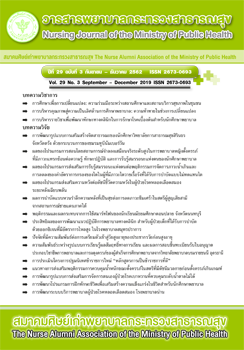Development of Promoting Self-Management Model among Uncontrolled Diabetic Patients
Main Article Content
Abstract
This participatory action research aimed to develop a self-management promoting model for uncontrolled diabetic patients. The purpose was to develop a self-management promoting model for preventing complications and developing the quality of life of diabetic patients with uncontrolled glycaemia. The 15 uncontrolled diabetic patients were recruited using purposive sampling. The research instruments used were a questionnaire of self-management behavior, a questionnaire of self-management performance, a questionnaire of stage of change and quality of life questionnaire. The Cronbach’s alpha coefficient ranged from .69 to .97. The research process consisted of three steps: preparation and process step which consisted of exploring baseline data; development of the model; testing the model and evaluating the effectiveness of the model. The data were analyzed using frequency, percentage, mean, standard deviation, and content analysis.
The research results revealed that the model was developed though the collaboration among the research team, nurses, and uncontrolled diabetic patients. The process of developing the model consisted of 1) evaluating the readiness for change and setting of the goals, 2) reviewing self-management goals, 3) promoting and providing data, 4) monitoring and home visits, 5) evaluating the problem, 6) creating the helping channel, 7) approaching the vulnerable group, and 8) supporting from family and community. The effectiveness of the model showed that uncontrolled diabetic patients had a significantly higher self-management behavior score, self-management performance score and quality of life score than those of the baseline, at a level of .05.
This study suggestes that the model should be applied to support in the patients with chronic illness to adjust their health behaviors. This model also suggests more frequent visit to promote glycaemia control and decrease the complications resulting from diabetes among patients.
Article Details
บทความและรายงานวิจัยในวารสารพยาบาลกระทรวงสาธารณสุข เป็นความคิดเห็นของ ผู้เขียน มิใช่ของคณะผู้จัดทำ และมิใช่ความรับผิดชอบของสมาคมศิษย์เก่าพยาบาลกระทรวงสาธารณสุข ซึ่งสามารถนำไปอ้างอิงได้
References
2. Sawetsrisakul P. Situation and alternative ways to solve the problem of illness until bankruptcy in Thailand. Journal of Health Promotion and Environmental Health [internet]. 2008. [cited 2018 December 13. Available from: http://advisor.anamai.moph.go.th/main.php?filename=JHealthVol21No4_10. (in Thai)
3. Browder DM, Shapiro ES. Applications of self-management to individuals with severe handicaps: a review. Journal for the Association for Persons with Severe Handicaps 1985:10(4):200-8.
4. Dongbo F, Hua F, McGowan P, Yi-e S, Lizhen Z, Huiqin Y, et al. Implementation and quantitative evaluation of chronic disease self-management programme in Shianghai, China: randomized controlled trial. Bulletin of the world Health Organization 2003;81(3):174-82.
5. Clement S. Diabetes self-management education: a technical review. Diabetic Care 1995;18: 1204-14.
6. Lemon CC, Lacey K, Lohse B, Hubacher DO, Klawitter B. Outcomes monitoring of health, behavior, and quality of life after nutrition intervention in adults with type 2 diabetes. Journal of the American Dietetic Association 2004;104:1805-15.
7. Methakanjanasak N. Self-management of end stage renal disease patients receiving hemodialysis [Doctoral thesis]. Chiang Mai: Chiang Mai University. 2005.
8. Norris SL, Lau J, Smith SJ, Schmid CH, Engelgau MM. Self-management education for adults with type 2 diabetes. Diabetes Care 2002;7:1159-71.
9. Schreurs KMG, Colland VT, Kuijer RG, Ridder DTD, Elderen T. Development, content, and process evaluation of a short self-management intervention in patients with chronic diseases requiring self-care behaviors. 2003.
10. Tobin DL, Reynolds RVC, Patient Education and Counseling 2003;51:133-41.
11. Goudswaard AN, Stolk RP, Zuithoff NPA, de Valk HW, Rutten GEHM. Long-term effects of self-management education for patients with type 2 diabetes taking maximal oral hypoglycemic therapy:a randomized trial in primary care. Diabetic Medicine 2004;20:491-6.
12. Intarakamhang U, Chuchoum O, Nerdtip W, Duagchai P. Project management and project evaluation for health behavior change of office in Bangkok. Journal of behavior science 2009;15(1):28-38. (in Thai).
13. Wattana C. An integrative review of diabetes self-management program on glycemic control, cardiovascular risk factors, and quality of life of people with type 2 diabetes (Unpublished). Chiang Mai. 2004.
14. Wattana C, Pothiban L. Self-management in blood glucose controlling of poor controlled type 2 diabetic patients (Unpublished).Chiang Mai. 2003.
15. Namwong T, Klinchart R, Ratchavichai S. The results of the use of self-management promotion program in diabetic patients using insulin Journal of Phrapokklao Nursing College, Chanthaburi 2018;29(2):186-96. (in Thai)
16. Klinchart R, Namwong T, Rachaphanich S, Rungpan N, Thongma N. Promoting blood glucose control according to the sufficiency economy philosophy in diabetic patients. Journal of Phrapokklao Nursing College, Chanthaburi. 2018;29(2):197-209. (in Thai).
17. Glasgow RE, Toobert DJ, Hampson SE, Strycker LA. Implementation, generalization and long-term results of the “choosing well” diabetes self-management intervention. Patient Education and Counseling. 2002; 48: 115-22.
18. Creer. Self-management. In M Bockaert, PR Pintrich, M Zeidner (Eds.), Handbook of self- regulation. San Diego; California: Academic Press. 2000.
19. Chuenrum K, Chaichana B, Sri Charoen RK. Development of self-care model In non-insulin dependent diabetic patients at Sukhirin Hospital With participatory planning techniques (AIC).2016;3(3):179-93. (in Thai).

